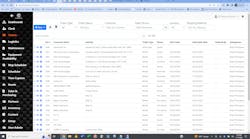Joe Lewis, CEO, Fame Rental, talks with RER about integrating a wide variety of business functions, the importance of information sharing between programs, the promise and the dangers of artificial intelligence, and more.
RER: What have been the most important achievements of your software in the past year?
Lewis: Our FameAir platform is new and revolutionary in almost every sense. We have devoted ourselves to making it both comprehensive and stable, and that is a game-changer for the rental industry. Fame Rental is a fully integrated ERM system that connects everyone in a rental company in real time — with rental equipment (assets) being at the center of the universe. For all that we have accomplished in the past two years, we are just getting warmed up! Stay tuned.
What have been the most important advancements in capabilities, i.e., enabling rental companies to improve their efficiencies?
Lewis: Our most significant advancement with the Fame Rental database platform is that all operational tasks for a rental company can be pulled together into one seamless, real-time, paperless source. Using FameAir's web platform, for example, a rental ticket is captured at the counter, a 'pick, pack, deliver' task is created for the team in the yard, inspections are performed, photos are taken and saved, and the customer's signature is obtained. The ticket goes “on rent,” with every function performed in a seamless, paperless process.
Even the exceptions and unexpected are covered with Fame Rental. For example, if during the inspection you find that an asset is determined to not be rent-ready, a repair work order is immediately generated, and that unit is marked as unavailable.
This question is not so much “What are your next products?” as much as “Where does your software go in the next few years?” or perhaps better asked, “What are customers expecting in the next level of software?”
Lewis: Our customers want all business functions neatly integrated, including outside web services. A good example is sales tax compliance. As an option, Fame Rental can seamlessly integrate with Avalara, the leader in this space. There are so many more functional areas like this, and we see Fame connecting to any industry best practices, seamlessly integrating the Internet of Things into everyday functions.
I’m sure you keep your eye on software developments in the world beyond this industry. What are some of the developments or trends in software that you’ve noticed in other industries that you admire, whether or not they are relevant to the rental industry?
Lewis: What is fascinating about the rental industry is that the process of renting equipment and items is only a fraction of what they do. At the end of the day, they are businesses that need to operate like any other well-run business. That requires “best practice” capabilities for a myriad of business functions, business planning, providing field service and logistics, running a maintenance shop, and much more.
From setting Key Performance Indicators to utilizing practices like Lean Management, various industries — regardless of the business they’re in — can learn so much from each other. A great example of this is how various businesses use web technologies to bring their customers and key vendors into a digital enterprise. This gives them real-time visibility into those things where they can be better served and can better serve you.
But on the flip side, some trends are concerning and should be acknowledged when crafting a five- or 10-year business strategy. The most unnerving is what I call “fragmenting your business into the cloud.” Running separate and fragmented point solutions for rental management, asset maintenance, field service and logistics, sales, CRM and accounting presents two huge problems.
First, because they are all separate from each other, there is no information sharing between programs. The saying “the left hand does not know what the right hand is doing” gets amplified in this scenario. That’s scary. Second, couple the segmentation with the fact that many or all these business functions are in a shared-tenet cloud solution. If you look closely, as with almost every cloud solution, you do not own your data. You simply have a level of access to it that is allowed by the provider. It has been said that the most valuable commodity in the world today is data - and you just give yours away. That’s doubly scary.
It seems there is a lot of discussion about artificial intelligence these days –AI is a popular buzzword. Is AI relevant to rental software?
Lewis: AI is relevant, and we are very closely tracking its utility for rental companies. My first observation is that AI is driven by data - and it needs lots of it. That is why cloud providers want your data, and why you need to protect yours. Secondly, having been in commercial software for more than 40 years, I have seen countless “popular buzzword technologies” get introduced, get over-hyped by marketing people, and then disappointingly delivered by the tech community.
On the one hand, I fear the extent to which that happens with AI. On the other hand, AI holds tremendous promise. Software companies like Fame Rental must deliver make-sense capabilities.
Anything you’d like to add?
Rental companies are also looking for easy-to-use, intuitive software as they move to the next generation of software or as they transition to new, younger staff.






